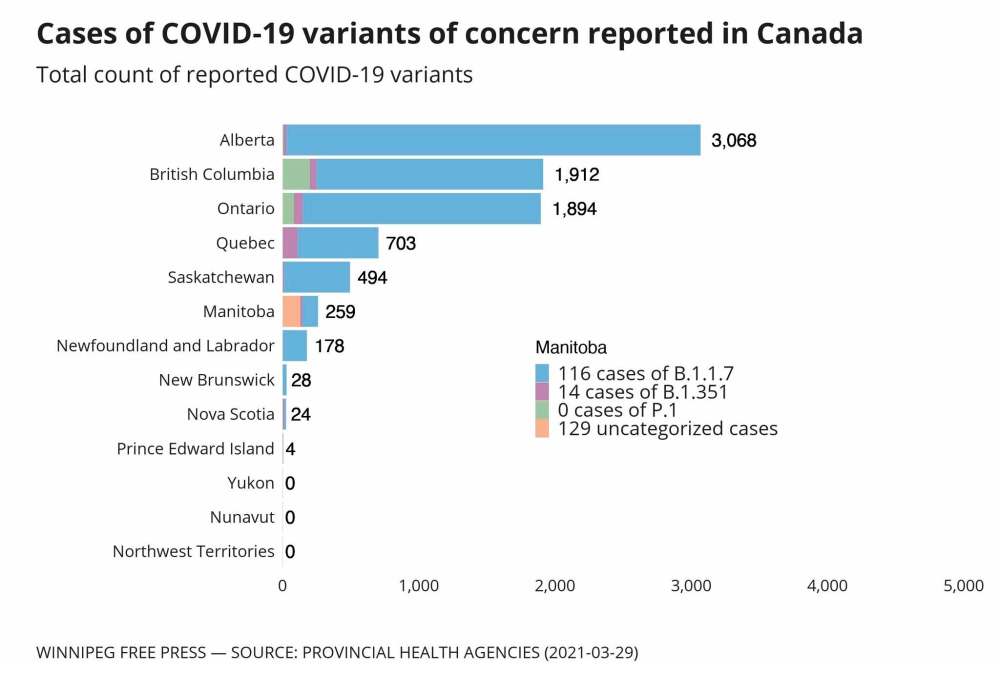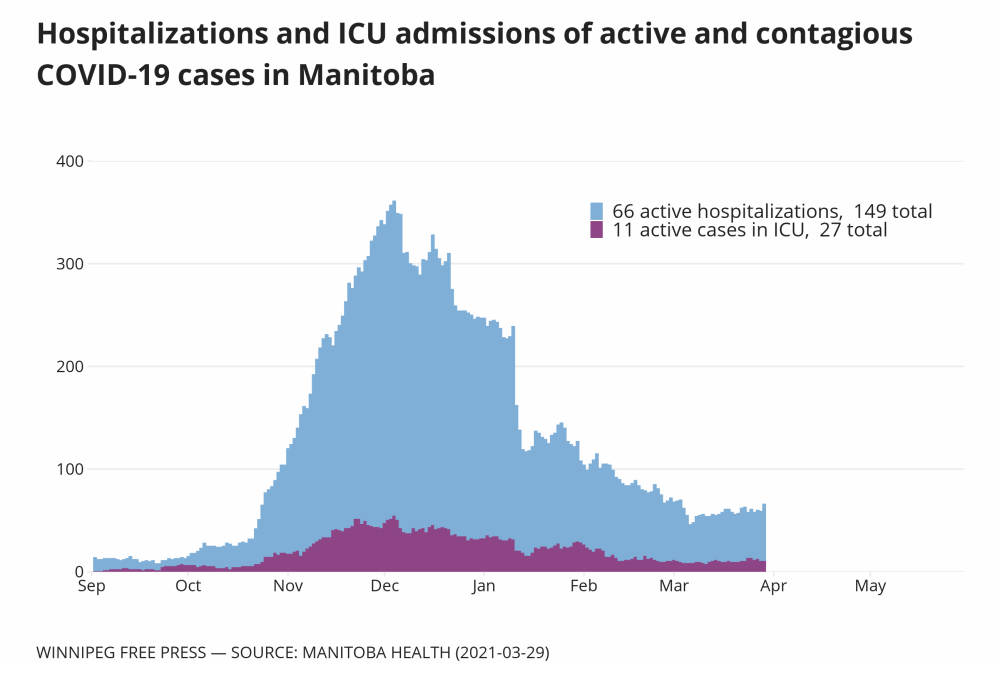U.K. COVID-19 variant becoming predominant strain in Manitoba
Read this article for free:
or
Already have an account? Log in here »
To continue reading, please subscribe:
Monthly Digital Subscription
$0 for the first 4 weeks*
- Enjoy unlimited reading on winnipegfreepress.com
- Read the E-Edition, our digital replica newspaper
- Access News Break, our award-winning app
- Play interactive puzzles
*No charge for 4 weeks then price increases to the regular rate of $19.00 plus GST every four weeks. Offer available to new and qualified returning subscribers only. Cancel any time.
Monthly Digital Subscription
$4.75/week*
- Enjoy unlimited reading on winnipegfreepress.com
- Read the E-Edition, our digital replica newspaper
- Access News Break, our award-winning app
- Play interactive puzzles
*Billed as $19 plus GST every four weeks. Cancel any time.
To continue reading, please subscribe:
Add Free Press access to your Brandon Sun subscription for only an additional
$1 for the first 4 weeks*
*Your next subscription payment will increase by $1.00 and you will be charged $16.99 plus GST for four weeks. After four weeks, your payment will increase to $23.99 plus GST every four weeks.
Read unlimited articles for free today:
or
Already have an account? Log in here »
Hey there, time traveller!
This article was published 29/03/2021 (1716 days ago), so information in it may no longer be current.
6.4 per cent of Manitobans infected with highly contagious strains of COVID-19 had to be hospitalized, the province confirmed Monday.
As Manitoba moves closer to tracking the real-time effects of novel coronavirus variants of concern, the proportion of hospitalizations and intensive care admissions is expected to become an important indicator of the province’s pandemic response.
In other provinces, more people — many of them young — are getting sicker, are ending up in hospital and having to stay longer due to highly contagious variants.
It could happen here, Manitoba’s top doctor warned Monday.
Chief provincial public health officer Dr. Brent Roussin said the province will now report the number of cases determined to be caused by variants of concern, after screening by Cadham Provincial Laboratory.
That’s why, he said, the number of highly contagious variant cases announced Monday was more than double Friday’s total.
The total number of concerning variant cases has now reached 250.
Of those, 16 people had to be hospitalized and seven ended up in the ICU, a provincial spokesperson said in response to a Free Press inquiry. It’s not clear how many of those cases were still in hospital, since screening for variants took some time.
Previously, the province would wait until the Winnipeg-based National Microbiology Lab performed genetic sequencing — a time-consuming and resource-intense process — to confirm the presence of a variant before making a public announcement.
“Not every variant of concern screened-positive sample requires sequencing anymore,” Roussin said.
“To date, we have only been reporting sequenced positive (variants of concern) but because our manner of screening has become so precise, we’ll begin reporting on all VOCs that screen positive.”
Current public health orders that mandate physical distancing and limit gathering sizes will still combat the rapidly spreading variants, Roussin said when asked if Manitobans should change their behaviour in response to increasing transmission of variants of concern.
He said most of those cases are still being spread via household contacts rather than community transmission. Roussin could not provide data on outdoor transmission of the more-contagious variants in Manitoba.
“The public health measures that are in place are, if followed, they’re still going to be useful against the variants of concern, and those are just those fundamentals,” he said.
It’s often more important to look at the proportion of contagious variant cases and how quickly they’re spreading, than simple daily COVID-19 case counts, said Winnipeg epidemiologist Cynthia Carr.
“It really doesn’t take much for these variants of concern to become the dominant strain,” she said Monday. “So we don’t want to panic people, but this is more in line with what an epidemiologist would consider a… new wave,” as compared with general caseload surges.
Canada’s chief public health officer, Dr. Theresa Tam, was keynote speaker Monday at an Institute of Corporate Directors webinar, which Carr attended. Tam made clear there is even less room for error in the country’s pandemic response because of the emergence of highly infectious variants, Carr said.
“We really need to do everything we can to keep these cases controlled and stop the spread. So, Dr. Roussin used his terminology, and Dr. Tam just today said ‘leverage our strengths,'” Carr said.
“She didn’t also say we need to go back to more restrictions, but she said we need extreme caution and not to let our guard down because… she said very clearly, the variants mean there’s less room for error right now.”
A total of 250 cases involving highly contagious variants have been detected in Manitoba, the majority being the U.K. variant.
Up to one-third of all cases screened in Manitoba on a single day last week were caused by the B.1.1.7 variant, Roussin said Monday.
“This is showing us that the B.1.1.7 strain, like many jurisdictions in Canada, is becoming the predominant strain,” he said.
“As these numbers get higher and higher, the value of sequencing, the value of screening becomes less and less because we know what the predominant variant is.”
Meanwhile, 53 new COVID-19 cases were reported Monday in Manitoba. The five-day test positivity rate was 4.2 per cent province-wide.
Twenty-one cases were logged in Winnipeg, where the test positivity rate was 3.3 per cent.
There were 27 cases reported in North Health, two in Interlake-Eastern, two in Prairie Mountain, and one in Southern Health.
No new deaths due to COVID-19 were reported Monday.
katie.may@freepress.mb.ca
danielle.dasilva@freepress.mb.ca

Katie May is a general-assignment reporter for the Free Press.

Our newsroom depends on a growing audience of readers to power our journalism. If you are not a paid reader, please consider becoming a subscriber.
Our newsroom depends on its audience of readers to power our journalism. Thank you for your support.
History
Updated on Monday, March 29, 2021 6:39 PM CDT: Updates final
Updated on Tuesday, March 30, 2021 1:31 PM CDT: The province provided incorrect data on variant case totals and hospitalization figures Monday. According to the updated figures released to the Free Press Tuesday, a total of 250 cases involving highly contagious variants have been detected in Manitoba -- the majority being the U.K. variant. Based on the updated figures, the province now says 16 people, all from Winnipeg, who were infected with the U.K. variant had to be hospitalized. Seven of those cases ended up in the ICU. That means the hospitalization rate for Manitobans infected with more contagious variants is 6.4 per cent, not eight per cent as we previously reported.
Updated on Tuesday, March 30, 2021 1:32 PM CDT: Corrects numbers throughout story, per updated figures provided by province.










